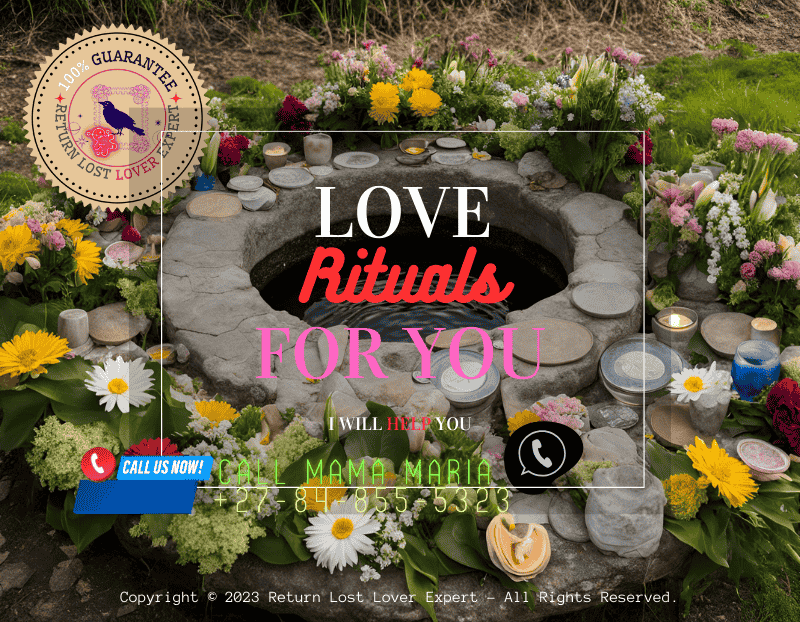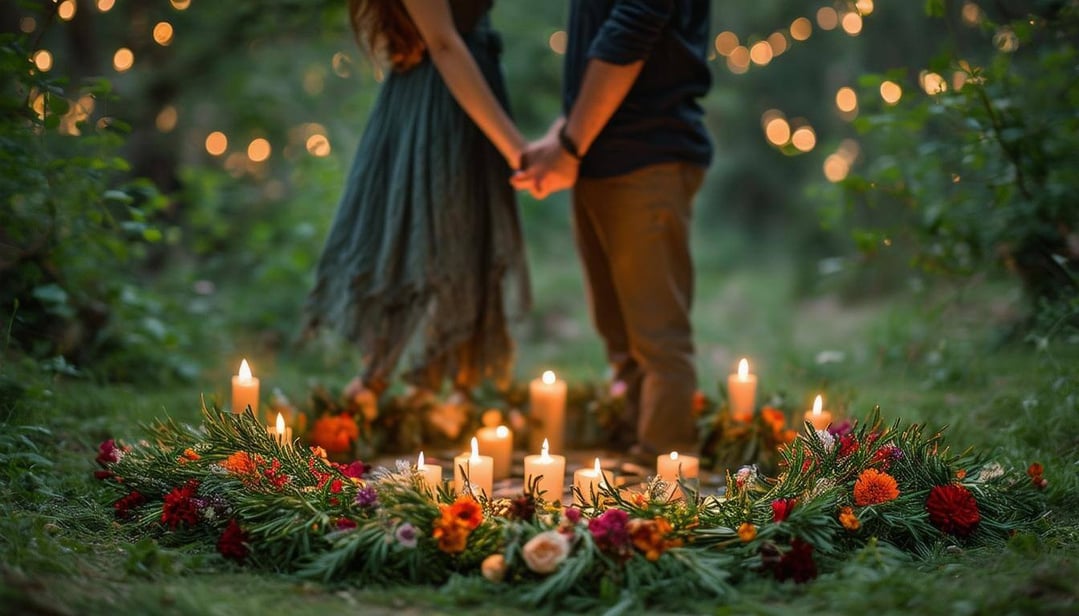Explore Celtic love spells rooted in nature and myth, focusing on knot magic, herbal potions, and water rituals to attract love and strengthen bonds.

Love Spells in Celtic Traditions: Magic Rooted in Nature and Myth
Celtic traditions are steeped in mysticism, folklore, and a profound connection to nature. Love spells in Celtic culture reflect these values, blending symbolic rituals, sacred elements, and a respect for the natural world. Drawing from Druidic practices, ancient Irish folklore, and traditional Celtic knot magic, these spells are often used to attract love, strengthen bonds, or ensure fidelity.
This post is part of the larger pillar: Love Spells in Different Cultures: A Global Exploration.
The Foundation of Love Spells in Celtic Culture
Celtic love spells are deeply connected to the elements of earth, air, fire, and water, emphasizing harmony with the natural world. They often incorporate:
- Herbs and Plants: Sacred to the Celts, certain herbs like rosemary and yarrow carry symbolic meanings.
- Knot Magic: Interwoven knots represent unity, love, and eternity.
- Moon Phases: The waxing moon is ideal for attraction spells, while the full moon strengthens emotional bonds.
Types of Love Spells in Celtic Traditions
1. Knot Magic for Love
Celtic knots, known for their intricate and endless patterns, symbolize eternal love and connection.
- Binding Spells: Knots are tied with intentions to strengthen romantic bonds.
- Handfasting Rituals: Couples tie cords around their hands during ceremonies to symbolize unity and commitment.
Practical Spell:
- Use red and green ribbons (red for passion, green for growth). As you tie the knots, focus on your love intention, speaking affirmations aloud.
2. Herbal Love Potions
Herbs play a significant role in Celtic magic, with specific plants used for love rituals.
- Rosemary: Enhances fidelity and memory in relationships.
- Thyme: Attracts love and restores trust.
- Yarrow: Believed to strengthen the emotional connection between partners.
Simple Love Potion: Brew a tea with yarrow and honey, then drink it during a waxing moon while visualizing your romantic intentions.
3. Water Blessing Rituals
Water holds spiritual significance in Celtic traditions, often seen as a symbol of purification and emotional flow.
- Sacred Wells: Offerings like flowers or coins are left at sacred wells or springs while making love-related wishes.
- River Rituals: Cleansing oneself in a river is believed to remove negativity and attract love.
.png?width=800&height=622&name=Herbs%20like%20rosemary%20and%20thyme%20arranged%20in%20a%20circle%20with%20candles%20for%20a%20Celtic%20love%20spell.%20(1).png)
Symbolism in Celtic Love Spells
1. The Power of the Trinity
Celtic symbols often feature triads, reflecting the interconnectedness of life, love, and spirituality. The Triquetra (Trinity Knot) is commonly used in love spells to signify the unity of mind, body, and spirit.
2. The Role of Nature Spirits
Celtic spirituality honors faeries (the Fae) and other nature spirits, believed to influence matters of love and fortune. Offerings such as milk, honey, or bread may be left in nature to seek their favor.
Ethical Considerations in Celtic Love Magic
Celtic traditions emphasize respect for the natural world and personal freedom. Key principles include:
- Free Will: Love spells should nurture mutual affection and never manipulate another’s emotions.
- Balance and Harmony: Rituals must align with the energies of nature to maintain balance.
- Gratitude to the Elements: After performing a spell, express thanks to the earth, water, and spirits involved.
Practical Tips for Practicing Celtic Love Spells
- Work with Nature: Incorporate natural elements like flowers, herbs, and stones into your rituals.
- Honor the Moon: Time your spells with lunar cycles to enhance their power.
- Learn the Symbols: Use Celtic symbols like knots or spirals to amplify your intentions.
Related Articles to Deepen Your Understanding
- Love Spells Indigenous Cultures: A Journey Through Ancient Traditions
- History of Love Spells
- Cultural Significance of Love Spells: Unveiling Traditions and Impact

Unique FAQs About Celtic Love Spells
1. What is knot magic, and why is it significant in Celtic love spells?
Knot magic involves tying knots to symbolize connection and intention. In love spells, it represents unity, fidelity, and the eternal nature of romantic bonds.
2. Are specific locations important in Celtic love rituals?
Yes, natural sites like sacred wells, groves, or rivers are often chosen for their spiritual energy and connection to Celtic deities or spirits.
3. How do the Fae influence Celtic love spells?
The Fae, or nature spirits, are believed to have magical powers that can influence love and fortune. Respectful offerings may gain their favor, enhancing the success of love spells.
Images
- A Celtic handfasting ceremony with ribbons tied around the couple’s hands, symbolizing unity and commitment.
- Herbs like rosemary and thyme arranged in a circle with candles for a Celtic love spell.
- A sacred well surrounded by offerings of flowers and coins used in a Celtic water blessing ritual.
A serene scene unfolds in a lush green glade, where a couple stands hand in hand, their hands bound together with intricately woven red and green ribbons, symbolizing unity and commitment. Surrounding them, vibrant herbs like rosemary and thyme are artfully arranged in a circle, their earthy fragrance mingling with the warm glow of flickering candles. In the background, a sacred well glistens under the dappled sunlight, adorned with colorful flowers and shimmering coins, offerings made for love and blessings. The air is filled with a sense of mysticism and connection to nature, with delicate, ethereal faeries flitting among the trees, their presence hinted at by glimmers of light. Above, the waxing moon casts a gentle glow, adding an enchanting aura to the ritual, where love, nature, and ancient traditions intertwine in a harmonious dance.

External Links for Further Reading
- "The History and Meaning of Celtic Knotwork in Rituals"
- "The Role of Sacred Wells in Celtic Spirituality"
Explore more love spell traditions globally through our parent page: Love Spells in Different Cultures. For personalized guidance, visit Mama Maria Katega’s page.
YOU MAY ALSO LIKE
These related articles
%20(1).png?width=80&height=80&name=Untitled%20design%20(23)%20(1).png)
Comments
Add your comment